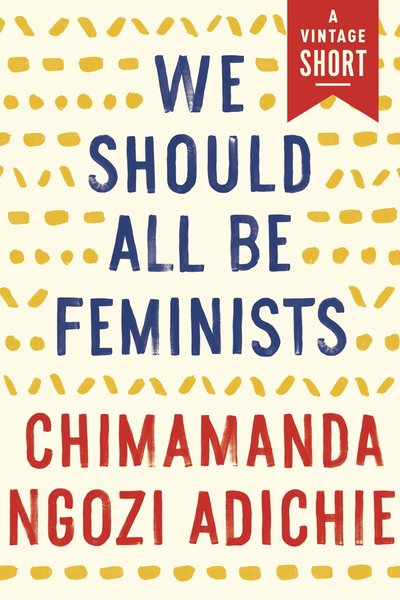We Should All Be Feminists
Nigerian writer Adichie's pamphlet expanded from her TED talk redefines 21st-century feminism through personal experiences and sharp observations, making this concept more accessible and relatable.

📝 Book Review
“We Should All Be Feminists” is Nigerian writer Chimamanda Ngozi Adichie’s important work expanded from her 2012 TEDx talk and published in 2014. This concise yet powerful book reinterprets feminism’s modern meaning in the 21st century through its personal perspective and profound insights, becoming one of the most influential and accessible works in contemporary feminist literature. Through this book, Adichie not only removed stigmatizing labels from feminism but also provided readers worldwide with a completely new entry point for understanding and accepting gender equality concepts.
Chimamanda Ngozi Adichie, as one of the most important contemporary African women writers, brings special value and significance to this book through her unique identity and rich experiences. Born in 1977, she is an outstanding Nigerian writer whose representative works include the widely acclaimed “Americanah” and “Purple Hibiscus,” which have achieved tremendous success not only in literary circles but also earned her numerous important awards including the MacArthur Genius Grant.
As a writer enjoying high reputation in global literary circles, Adichie’s statements carry special authority and influence. Her African identity and international perspective enable her to examine and articulate feminism’s universal values from a unique angle.
Redefining Feminism for the Modern Era
Adichie provides a definition of feminism that is both concise and powerful in the book: “A feminist is a person who believes in the political, economic and social equality of the sexes.” The brilliance of this definition lies in its complete abandonment of complex theoretical terms and academic vocabulary, making feminism understandable and acceptable to anyone.
This simplification is not superficial but represents profound wisdom. It distills feminism’s core concept into its most basic, easily transmissible form, thereby greatly expanding feminism’s audience. This approach demonstrates how effective communication can make radical ideas accessible without diluting their essential message.
The definition’s power also lies in its inclusivity—by focusing on belief in equality rather than specific identities or experiences, it opens space for people of all backgrounds to identify as feminists while maintaining focus on structural change.
Analysis of Gender Expectations and Their Harm
When analyzing the harm of gender expectations, Adichie demonstrates her profound observational and analytical abilities. She provides detailed analysis of negative impacts that social gender expectations impose on both men and women, with this comprehensiveness reflecting her balanced perspective.
For women, society expects docility and compliance, expectations that limit women’s personality expression and autonomous development. Hidden limitations in career choices prevent many talented women from fully realizing their potential. Cultural pressures around appearance and body shame systematically undermine women’s confidence and self-esteem. Most importantly, women’s leadership abilities are frequently questioned, which not only hinders women’s career development but also deprives society of benefits from women’s leadership.
Simultaneously, Adichie profoundly analyzes how gender expectations constrain men. Society expects men to appear tough and not show vulnerability, expectations that deprive men of rights to express emotions and seek help. Suppressed emotional expression not only affects men’s mental health but also prevents them from building deep interpersonal relationships.
The heavy burden of economic responsibility creates enormous psychological pressure for men, while difficulty participating in family caregiving work deprives them of experiencing complete family life. This analysis reveals how patriarchal systems harm everyone, not just women.
Cultural Relativity and Universal Values
As an African woman, Adichie demonstrates special wisdom and sensitivity in discussions of cultural relativity versus universal values. She particularly emphasizes that feminism is not a Western monopoly, a viewpoint that powerfully counters criticism equating feminism with Western cultural imperialism.
She argues that traditional cultures need to embrace equality while maintaining their distinctive features. This perspective both respects cultural diversity and insists on gender equality’s universal value. More importantly, she clearly opposes using “cultural tradition” as an excuse to maintain gender inequality, a stance reflecting her firm defense of women’s rights.
This approach provides crucial frameworks for understanding how feminist principles can be adapted and applied across different cultural contexts without imposing uniform solutions or dismissing local knowledge and practices.
Personal Experiences as Theoretical Foundation
Adichie’s personal experiences shared in the book provide vivid empirical support for her theoretical viewpoints. Her described growing-up experiences in Nigeria include widespread gender discrimination phenomena in schools that appear minor but profoundly influence children’s gender concept formation.
Traditional gender role expectations within families shape individual gender cognition from the most intimate spaces. Challenges faced as a woman in academic and professional fields reflect gender discrimination’s deep penetration throughout social levels.
Her international perspective adds important comparative and universal dimensions to the book. As an African woman living in America, Adichie observes that problems faced by women in different cultural backgrounds show surprising similarities, powerfully proving gender inequality’s global characteristics.
Cross-identity experiences enable her to understand identity politics’ complexity and importance more profoundly. New manifestations of gender inequality under globalization reflect traditional gender oppression’s new changes and challenges in modern society.
Education as Foundation for Change
Education occupies a central position in Adichie’s theoretical system as she profoundly recognizes that change must begin with education. Cultivating gender equality consciousness from childhood can fundamentally change society’s gender concepts. Encouraging girls to pursue academic achievement can break traditional gender expectations.
Educating boys to respect women and share domestic responsibilities can cultivate new generations of men’s equality consciousness. Regarding specific suggestions, she advocates not limiting children’s interests and choices based on gender, an approach that allows every child to develop freely according to their talents and interests.
Teaching children to question traditional gender roles cultivates their critical thinking and independent judgment abilities. This educational approach emphasizes long-term cultural transformation rather than merely addressing symptoms of inequality.
Characteristics of Fourth Wave Feminism
This book is widely considered to represent important characteristics of fourth-wave feminism, which reflect contemporary feminism’s developmental trends and zeitgeist. Inclusivity manifests in welcoming people of all genders to participate in feminist movements, an open attitude that expands the movement’s foundation.
Internationalization appears in its attention to gender issues globally, reflecting globalization era characteristics. Intersectionality considers influences of multiple identities including race and class, embodying recognition of complexity. Practicality provides specific action guidance, enabling theory to transform into practice.
These characteristics distinguish fourth-wave feminism from earlier waves while building on their foundations, demonstrating how feminist thought continues evolving to address contemporary challenges and opportunities.
Global Impact and Cultural Influence
This book has generated extensive and in-depth social discussion around core questions. Discussions about what constitutes true gender equality prompt people to reconsider equality’s meaning and achievement pathways. How to advance women’s rights while maintaining cultural diversity involves complex relationships between universal values and cultural relativity.
Questions about men’s roles in feminist movements relate to movement inclusivity and effectiveness. The book’s global influence is enormous and far-reaching. The TED talk has been viewed over 6 million times, proving this message’s widespread reach and influence.
Translation into multiple languages enables readers from different cultural backgrounds to access these ideas. Becoming required reading for many university courses proves its academic value and educational significance. Influence on new generations of young feminists establishes foundations for movement future development.
Celebrity endorsements including Beyoncé’s have helped feminist concepts successfully enter mainstream culture. This celebrity effect not only expanded the work’s influence but also elevated feminism’s status and acceptance in popular culture.
Reception and Criticism
This book has received widespread positive evaluation. People praise its concise, clear language and easy comprehension, successful integration of African and Western perspectives, excellent feminist primer for younger generations, and successful removal of feminism’s long-standing stigmatizing labels.
However, there are also different viewpoints and critical voices. Some argue the definition is oversimplified and may ignore feminism theory’s complexity. Challenges to traditional values have generated controversy and opposition from some conservatives. Some readers believe the book lacks deep theoretical analysis and remains mostly at surface levels.
These criticisms reflect broader tensions within feminist movements about accessibility versus complexity, and the challenges of making feminist ideas widely acceptable while maintaining their transformative potential.
Practical Guidance for Change
Regarding practical guidance, Adichie provides specific suggestions for both individual and social levels. At individual levels, she encourages people to question and challenge gender stereotypes, support women’s development around them, actively participate in gender equality dialogues, and practice equality concepts in daily life.
At social levels, she advocates promoting gender equality considerations in policy-making, supporting women’s education and career development, changing gender representation in media, and working to establish more inclusive social culture.
These practical applications demonstrate how broad theoretical commitments to equality can be translated into specific actions and behavioral changes in various contexts.
Extended Reading and Further Exploration
To help readers deeply understand related issues, Adichie provides extended reading suggestions. Related works include her other works “Dear Ijeawele,” as well as Roxane Gay’s “Bad Feminist,” Rebecca Traister’s “Good and Mad,” and Caroline Criado Perez’s “Invisible Women.”
She also suggests readers pay attention to intersectional feminism theory, postcolonial feminism, feminist movements in the Global South, and feminist practices in the digital age. These recommendations demonstrate the breadth of contemporary feminist scholarship and activism.
Contemporary Relevance and Future Directions
The book’s relevance extends beyond its initial publication to address ongoing challenges in gender equality worldwide. Its accessible approach to feminist concepts has influenced educational curricula, workplace diversity initiatives, and popular culture representations of gender issues.
The work’s emphasis on global perspectives and cultural sensitivity provides frameworks for understanding how gender equality movements can respect local contexts while maintaining commitments to universal human rights principles.
Conclusion: Accessibility and Inclusion as Feminist Values
“We Should All Be Feminists’” greatest value lies in its accessibility and inclusivity. Adichie successfully transforms complex feminist theory into language that ordinary people can understand and accept, helping more people recognize that gender equality is not merely women’s issue but important social issue concerning everyone’s welfare.
This book’s most important contribution is reminding us that feminism is not a radical or exclusionary concept but a simple idea about basic human rights and dignity. In the globalized 21st century, we need such voices to constantly remind us that regardless of cultural background, everyone deserves equal respect and opportunities, and true social progress must be built on gender equality foundations.
Adichie’s work shows us a feasible path toward a more equal and inclusive society—a path that respects cultural differences while insisting on universal values, focuses on theoretical construction while emphasizing practical application. Through her powerful combination of personal narrative, cultural analysis, and practical guidance, she demonstrates how feminist ideas can be both intellectually rigorous and widely accessible.
The enduring impact of “We Should All Be Feminists” lies in its demonstration that complex social transformation can begin with simple, clear ideas effectively communicated. By making feminism accessible to broader audiences, Adichie has contributed to expanding the movement’s base while maintaining its commitment to fundamental change in gender relations and social structures.
This work continues to inspire new generations of feminists while providing tools for ongoing conversations about equality, justice, and human dignity across cultural and geographical boundaries. Its legacy demonstrates the power of accessible feminist communication to create meaningful social change through education, dialogue, and inclusive activism.
Discussion
读书讨论
分享您对这本书的感想和看法,与其他读者交流见解
加入讨论
分享您对这本书的感想和看法,与其他读者交流见解
加载评论中...
Book Info
🛒 Get This Book
 Buy on Amazon
Buy on Amazon Related Books
读书讨论
分享您对这本书的感想和看法,与其他读者交流见解
加入讨论
分享您对这本书的感想和看法,与其他读者交流见解
加载评论中...

